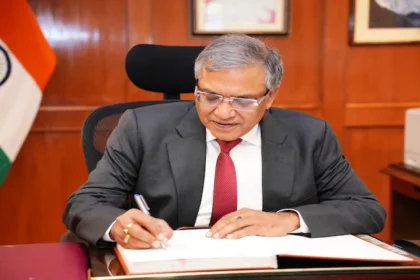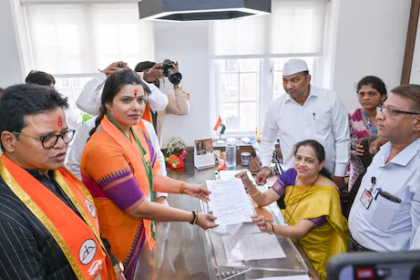Kiren Rijiju Supports Shashi Tharoor Amid Congress Criticism Over Surgical Strike Remarks
Kiren Rijiju Defends Shashi Tharoor Amid Congress Row Over Surgical Strike Remarks
Union Minister Kiren Rijiju has publicly come to the defense of Congress MP Shashi Tharoor, who is under fire from his own party after making comments abroad about India’s 2016 surgical strike across the Line of Control (LoC). The political storm unfolded after Tharoor, currently leading a multi-party delegation on a diplomatic mission, remarked during an event in Panama that India had crossed the LoC for the first time during the 2016 operation, carried out in response to a terrorist attack.
The comment has reignited internal strife within the Congress, with senior leader Udit Raj launching a scathing attack against Tharoor. Raj accused him of undermining the Congress party’s historical legacy and aligning with the Bharatiya Janata Party (BJP) narrative on national security.
Rijiju Slams Congress, Questions Patriotism
In a sharp rebuttal to Tharoor’s critics within the Congress, Kiren Rijiju posted on X (formerly Twitter):
“What does the Congress party want & how much they really care for the country? Should the Indian MPs go to foreign nation and speak against India and its Prime Minister? There’s a limit to political desperation!”
Rijiju’s comments reflect a growing concern within the ruling party that the Congress is prioritizing internal politics over national unity, especially when key figures like Tharoor are representing the country on the global stage.
BJP: Udit Raj Attacking Tharoor at Rahul Gandhi’s Behest
The controversy escalated further when the BJP alleged that Udit Raj’s criticism of Tharoor was orchestrated by Rahul Gandhi. According to BJP spokesperson Shehzad Poonawalla, Tharoor was being targeted by his party for placing national interest above party loyalty and the Gandhi family.
“Shashi Tharoor is being attacked at the behest of Rahul Gandhi because Shashi Tharoor kept India first, not the (Gandhi) family. He talked about national interest, not his party’s interest. He is being attacked because he kept national policy above vote bank politics,” Poonawalla stated to news agency PTI.
He also noted the contradiction between the Congress’s public support for the armed forces and its internal attacks on leaders like Tharoor who align with India’s official stance on cross-border terrorism.
Udit Raj’s Scathing Critique
Udit Raj, who has often courted controversy for his outspoken remarks, was quick to lash out at Tharoor. Mocking the Thiruvananthapuram MP’s diplomatic overtures, Raj wrote that Tharoor should be “appointed the super spokesperson of the BJP,” suggesting that his statements aligned more with BJP’s narrative than Congress’s.
His statement added fuel to the ongoing tension within the party, as factions disagree on how to respond to national security issues and foreign diplomacy.
Congress’s Inconsistent Messaging
The BJP has seized the opportunity to accuse the Congress party of sending mixed signals when it comes to national security. Poonawalla pointed to previous remarks by Congress leaders, including Rahul Gandhi and party president Mallikarjun Kharge, who referred to ‘Operation Sindoor’ as a “chut-put yudh” (sporadic skirmish).
Such terminology, the BJP argues, trivializes India’s military efforts and undermines the sacrifices made by the armed forces.
Furthermore, Poonawalla accused the Congress of giving a “clean chit” to Pakistan in the context of the April 22 terror attack in Pahalgam, Jammu and Kashmir. He likened the Congress’s rhetoric to that of Pakistan’s Inter-Services Public Relations (ISPR), claiming,
“Today, the Congress, while talking like Pakistan’s DG ISPR Ahmed Sharif Choudhry, is launching missiles at its own leader (Shashi Tharoor). It won’t say a word against Pakistan. It will give clean chit to Pakistan.”
Tharoor’s Diplomatic Role and National Focus
Amid the controversy, Tharoor has not responded directly to his critics within the Congress. However, his recent speeches and diplomatic outreach, including his leadership of the all-party delegation abroad, have focused strongly on exposing Pakistan’s terror links and affirming India’s position on counter-terrorism.
In Panama, Tharoor and his delegation met with top government officials, including the President and Foreign Minister, and presented evidence of Pakistani Army officials attending the funerals of UN-designated terrorists. The move was intended to showcase Pakistan’s ongoing support for terror groups despite international sanctions and condemnation.
A Battle of Ideologies
This incident highlights a broader ideological rift within the Congress party between leaders focused on international diplomacy and national security, like Tharoor, and others more rooted in party narrative and internal politics. It also reflects the growing challenge for Congress to maintain a unified message on critical national issues.
With the Lok Sabha elections approaching and foreign policy increasingly playing a role in domestic discourse, such public disagreements are likely to impact voter perception. The BJP, for its part, has capitalized on this divide to project itself as the only party that puts “nation first.”
Conclusion
The political drama surrounding Shashi Tharoor’s remarks and the reactions from both within his party and outside it underscore a deeper question: Can a political party afford to sideline its own members for speaking in alignment with national interest, even if it means stepping beyond traditional party lines?
As Tharoor continues his international outreach mission, his situation presents a test not only for the Congress party’s internal cohesion but also for how India’s democratic institutions balance diplomacy, patriotism, and political loyalty.








